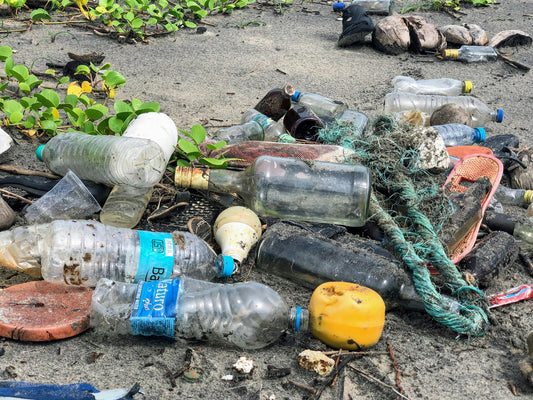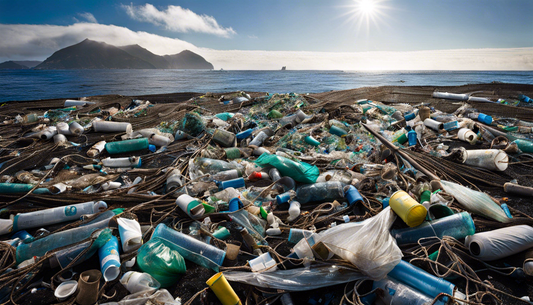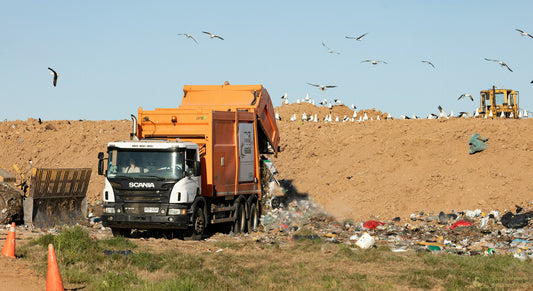
Innovations Leading the Fight Against Plastic Pollution in 2024
Share
One of the most pressing environmental issues of the current generation is plastic pollution; plastics, especially microplastics, are found in the oceans, on the land, and in different ecosystems.
This pollution is a severe threat to wildlife, humans, and the well-being of our planet as a whole.
Many novel approaches are being adopted and practiced globally to address this challenging task.
Here, we will discuss some of the most recent innovations and campaigns against plastic waste.
Why There is a Need to Fight Plastic Pollution?

Before diving deeper into the problem, let’s look at some basic numbers that will make it easier to comprehend the extent of the problem with plastic pollution.
In a report, the Ellen MacArthur Foundation stated that without any changes, the amount of plastic in the sea could surpass the volume of fish by 2050.
The World Economic Forum reveals that the world creates North of 300 million tons of plastic waste annually – the same weight as the global population.
However, it is worth mentioning that the recycling rate of plastic is low, and according to available records, only 9% of all the plastics that have ever been produced have been recycled.
We need innovations across the full lifecycle of plastics to tackle this big issue. From reducing the production, to improving waste ccollection and recycling.
Innovations in Plastic Recycling

One of the most important areas of innovation is to enhance the plastic recycling process and technologies.
Conventional approaches to recycling are very ineffective and cannot accommodate the various forms of plastics. However, new methods are being developed to increase efficiency in the recycling process.
Chemical Recycling
Advanced recycling, also referred to as chemical recycling, involves recycling plastics through depolymerization or pyrolysis to generate their constituent monomers, which are then utilized to manufacture new plastics.
This process can accommodate a variety of plastics and non-homogeneous plastics, which are difficult to mechanically recycle.
Several companies, such as Brightmark and Agilyx, are already in this line of technology that transforms different types of plastics into valuable products, including fuel, wax, and new plastics.
Enzyme-Based Recycling
Enzymes have been found to degrade plastics faster than the currently used techniques.
For instance, scientists from the University of Portsmouth have developed an enzyme dubbed PETase that breaks down PET plastic in just a few days.
This discovery could significantly improve the efficiency of recycling PET plastics, which are usually found in beverage bottles and packaging.
Biodegradable and Compostable Plastics

One of the main challenges around plastic waste is that it daces centuries to break down.
An area that holds significant potential is the creation of biodegradable and compostable plastics. These materials are intended to degrade in the environment faster and with less harm to the environment than standard plastics.
PLA and PHA Plastics
Two bioplastics that people pay attention to are polylactic acid (PLA) and polyhydroxyalkanoates (PHA). PLA is derived from renewable materials such as cornstarch or sugarcane and is applied in products like disposable cutlery and food trays.
PHA is synthesized from organic material through microbial fermentation and can be composted in industrial facilities.
Many firms, including Danimer Scientific, are already leading the way in manufacturing such plastics.
Marine-Degradable Plastics
Scientists are also working on the creation of plastics that can decompose in seas to solve the problem of plastics in the oceans.
For instance, P&G has developed a new plastic shampoo bottle material that can dissolve in seawater within a year if it is washed into the sea.
Innovations in Plastic Waste Collection and Management

The Ocean Cleanup Project
Probably the most well-known and one of the largest projects in this area is The Ocean Cleanup by Boyan Slat. This effort seeks to extract plastic from the seas using technology.
Currently, the organization has created a system of floating barriers that help to gather the plastic garbage from the water's surface.
Their latest invention is the Interceptor, an anti-plastic net placed in rivers that filters plastic before it reaches the sea.
Precious Plastic Initiative
In Fiji, the Precious Plastic initiative has made remarkable strides in plastic waste management by collecting 30 tons of plastic and diverting over 10 tons from landfills.
This innovative project transforms recycled plastic into reusable products, including braille keyboards and wheelchair fittings. It showcases a sustainable approach to addressing plastic pollution while also creating valuable items that benefit the community.
The Role of Various Organizations Tackling Plastic Pollution

There are more recent examples of global companies investing a lot of money in the discovery of biodegradable and sustainable materials to replace plastics.
Angirus: Eco-Friendly Construction Materials
One example is Angirus, which manufactures an eco-friendly product called Wricks Bricks.
These bricks are made from 100% recycled plastic waste and construction debris and are environmentally friendly compared to normal bricks.
Not only are Wricks bricks 30% lighter than normal bricks, but they are also 80% water resistant.
This innovation minimizes the use of plastics and contributes to offering a sustainable and effective solution for building construction.
Hulladek: Waste Disposal and Management in India
Other start-ups, such as Hulladek in India, are also addressing the plastic issue directly through proper waste management.
As for the numbers, Hulladek has recycled 82,521 kg of waste and provided services to 15,000 households.
They embrace systematic plastic waste management, legal compliance in EPR, community engagement, and convenient disposal points.
Indo-Pacific Plastics Innovation Network (IPPIN):
Another key stakeholder in the fight against plastic pollution is the Indo-Pacific Plastics Innovation Network (IPPIN). IPPIN helps businesses in the Mekong region find new ways to counter the problem.
In Thailand, the IPPIN Accelerator program has helped support teams of entrepreneur researchers through mentoring.
It assists them in developing their concepts and establishing market applicability for their plastic waste reduction technologies.
What You Can Do to Help Reduce Plastic Pollution
The measures of innovation discussed here show the progress being made in the fight against plastic pollution.
However, the problem of plastic pollution is a complex issue that cannot be solved by any single organization or country but by all stakeholders willing and ready to contribute to the cause.
You can do your bit by supporting brands and companies that are conscious about the environment. Incorporating sustainable products into your life is an effective way to create change.
Innovation is essential when it comes to the problem of plastic pollution. Backing businesses and startups that work on creating sustainable materials, innovative recycling solutions, and efficient waste management can contribute to the shift to the circular economy.
It is also crucial to support and engage in initiatives that support and finance aspiring innovators focused on developing solutions that address plastic waste.
Did you know about these innovtions to tackle plastic pollution? Leave a comment below and engage in the discussion!
We hope you enjoyed this article. If you want to read more like this, make sure to check out our Blog and follow us on Instagram. If you are interested in truly sustainable products, check out our Shop.







